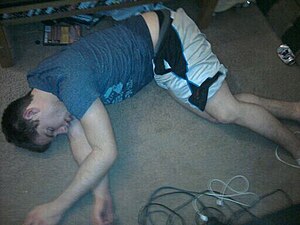Unconsciousness
Unconsciousness is a state in which a living individual exhibits a complete, or near-complete, inability to maintain an awareness of self and environment or to respond to any human or environmental stimulus.
This article needs additional citations for verification. (June 2007) |
Unconsciousness may occur as the result of traumatic brain injury, brain hypoxia (inadequate oxygen, possibly due to a brain infarction or cardiac arrest), severe intoxication with drugs that depress the activity of the central nervous system (e.g., alcohol and other hypnotic or sedative drugs), severe fatigue, pain, anaesthesia, and other causes.
| Unconsciousness | |
|---|---|
 | |
| An unconscious male human lying in a recovery position | |
| Specialty | Psychiatry Neurology Cardiology Pulmonology |
Loss of consciousness should not be confused with the notion of the psychoanalytic unconscious, cognitive processes that take place outside awareness (e.g., implicit cognition), and with altered states of consciousness such as sleep, delirium, hypnosis, and other altered states in which the person responds to stimuli, including trance and psychedelic experiences.
Causes
Potential causes of unconsciousness include:
- Traumatic brain injury
- Ischemic stroke
- Intracerebral hemorrhage
- Subarachnoid hemorrhage
- Seizure, all types of seizures
- Brain tumor
- Brain abscess
- Increased intracranial pressure
- Encephalitis
- Meningitis
- Hypoxia, or lack of oxygen
- Poison
- Kidney failure
- Liver failure
- Sepsis, in severe cases
- excessive blood loss
- Shock
Law and medicine

In jurisprudence, unconsciousness may entitle the criminal defendant to the defense of automatism, i.e. a state without control of one's own actions, an excusing condition that allows a defendant to argue that they should not be held criminally liable for their actions or omissions. In most countries, courts must consider whether unconsciousness in a situation can be accepted as a defense; it can vary from case to case. Hence epileptic seizures, neurological dysfunctions and sleepwalking may be considered acceptable excusing conditions because the loss of control is not foreseeable, but falling asleep (especially while driving or during any other safety-critical activity) may not, because natural sleep rarely overcomes an ordinary person without warning.
In many countries, it is presumed that someone who is less than fully conscious cannot give consent to anything. This can be relevant in cases of sexual assault, euthanasia, or patients giving informed consent with regard to starting or stopping a medical treatment.
See also
References

This article uses material from the Wikipedia English article Unconsciousness, which is released under the Creative Commons Attribution-ShareAlike 3.0 license ("CC BY-SA 3.0"); additional terms may apply (view authors). Content is available under CC BY-SA 4.0 unless otherwise noted. Images, videos and audio are available under their respective licenses.
®Wikipedia is a registered trademark of the Wiki Foundation, Inc. Wiki English (DUHOCTRUNGQUOC.VN) is an independent company and has no affiliation with Wiki Foundation.